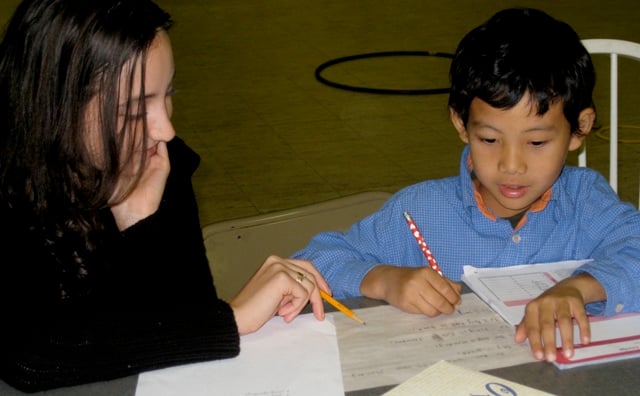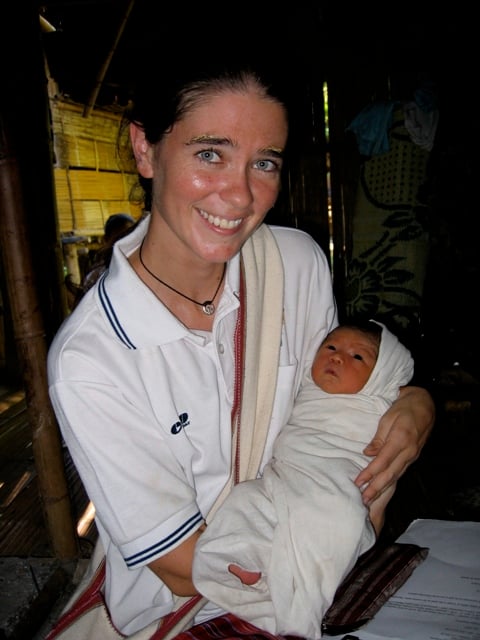
A driving lesson, a weaving group, a soccer game, a friend to take you grocery shopping or hold your baby while you study. These things and more are offered by the Worcester Refugee Assistance Project (WRAP) that is helping refugees from Burma assimilate to life in Central Massachusetts. Co-founded by nursing student Meredith Walsh and a handful of other committed volunteers, the fledgling organization is creating opportunities for refugees to learn from each other and from local volunteers, to share cultural traditions, to successfully navigate the complex health care and education systems—in short, to build a life in this country.
After graduating from Tulane with her master’s in public health and serving in the Peace Corps in the Philippines, Walsh spent four years in Thailand on the Burma border, first working in refugee camps, where she conducted health assessments for the American Refugee Committee (an international Non-Governmental Organization) and later at the world-renowned Mae Tao Clinic, where she worked in maternal and child health programming. While working in the clinic, she saw a way that she could have a greater impact.
“I came [to Worcester] because I needed clinical skills,” said Walsh. “Working in public health can be like looking at the forest and I wanted to be able to see the trees.” She enrolled in the Graduate School of Nursing’s Graduate Entry Pathway program so that she might someday return to a place like Thailand and offer more sustainable and far-reaching help. In the “teach a man to fish” tradition, Walsh said, “Ultimately I could go back to a setting similar to where I was working, perhaps training workers in a public health setting.”
Of the more than 2 million people who have fled Burma amidst the decades-long violent civil conflict, a handful—about 230—have resettled in the Worcester area, and new families arrive every few months. While studying nursing here, Walsh had a strong desire to continue to help the population she had come to know on the Thai-Burma border. Through word of mouth, she learned about a group of volunteers who were informally offering services to the local population from Burma. Joining them, she and her fellow volunteers formally founded WRAP a little more than a year ago and are working toward official status as a 501(c)(3) charitable organization. While all refugees have access to resettlement assistance from various federal programs, WRAP offers supplemental or “wrap-around” services that aren’t available elsewhere.

A cornerstone of the support that WRAP offers is a family-orientation program in which a refugee family is matched with a local volunteer who helps that family navigate day-to-day life in Worcester. Families get help with whatever they need—from going to the grocery store or visiting a park to scheduling a doctor’s appointment. So far, 12 matches have been made, with volunteers comprising students, faculty and employees, as well as volunteers from the Worcester community.
“This has been an especially mutually beneficial activity,” said Walsh. “The volunteers learn what it’s like to be new to this country, what it’s like to not speak English, to not be able to make an appointment for a sick child.” And new arrivals have an American friend in a place where it’s not always easy to make friends.
WRAP also provides much needed English-as-a-second-language (ESL) and basic literacy tutoring. While all refugees have access to similar federally supported ESL programs, WRAP offers one-on-one and small group tutoring tailored to the needs of these individual refugees. Language is a particular barrier for this population: most of them speak Kayah, a language that few others outside of Burma speak. This makes it especially difficult for them to be understood outside their small community, so learning English is important to their successful resettlement. Walsh, who speaks some Burmese, sometimes acts as an interpreter, and six refugees from Burma are in the process of training to become certified medical interpreters through the UMMS program.
WRAP also offers driver’s education preparation, including tutorials about the concepts behind the rules of the road, and hosts a twice-monthly weaving group where women and girls come together to socialize and make woven items to sell. Additionally, WRAP provides material support to the refugees in the form of donated goods and furniture, which are stored at the WRAP resource center in the Vernon Hill neighborhood of Worcester. The resource center—an old parish hall made available by a local church—serves as the home for WRAP and is the official meeting place for volunteers and the people they serve.
In addition to WRAP, Walsh is finding other ways to serve this population. Through a Schweitzer fellowship she received earlier this year, she runs a youth development project for refugees from Burma ages 15 to 24. The goal of the program is to help participants gain life skills that will help them with schoolwork, employment, higher education and other paths to successfully navigating American life with their dual identities.
Walsh also recently received a grant from the UMMS Office of Global Health that will take her back to the Thai-Burma border to study women’s health decisions related to contraceptive choices after the termination of a pregnancy. Walsh plans to carry out that research during the summer of 2011. She is hoping the research results will be applicable to refugees in Worcester as well.
While the refugee population from Burma in the Worcester area is relatively small, their experience reflects the larger experience of all displaced people who are building new lives in strange places far from home. The work that Walsh and her fellow volunteers are doing with this small group of people has the power to impact a much wider circle of individuals, as those touched directly by WRAP share their experiences and their knowledge with their larger—and growing—community.
For information about volunteering for WRAP or making a donation, contact Meredith Walsh at meredith.walsh@umassmed.edu.
Walsh received support from the Building on the Promise: Learn and Serve UMass grant, which facilitates service and service-learning opportunities for UMass students. As a Learn and Serve liaison, she receives a small weekly stipend to cover some of her time working on attaining charitable status for WRAP. She has also benefitted from community connections made available through UMass Worcester Learn and Serve Coordinator Heather-Lyn Haley, PhD, assistant professor of family medicine & community health and medicine. For more information about this grant, see the related story here: http://www.umassmed.edu/news/articles/2010/learn_serve_grant